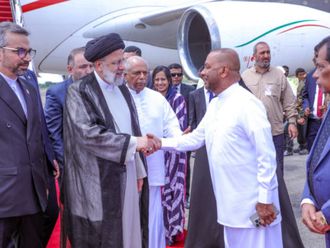
Tehran: Iran's Arabic-language television network Al Alam said on Wednesday it has again been taken off air by a Saudi-based satellite operator amid simmering tensions between Shi'ite Iran and US-allied Sunni Muslim Saudi Arabia.
Analysts say Riyadh and several other Arab governments allied to the United States are worried about a rise in Tehran's influence in the region through Shi'ite minorities.
Al Alam said in November that both the Saudi-based Arabsat network and Nilesat in Cairo had halted its broadcasting. In a statement yesterday, it said Arabsat later resumed broadcasting, before halting it again. It did not give details.
"Arabsat, in continuation of its censorship policies and as a move to confront the news networks which reflect the realities of the world, has today once again cut broadcasting of the Al Alam network," the Iranian broadcaster said on its website.
An official at Arabsat, based in Riyadh and owned by a group of Arab countries, was not immediately able to comment.
In November, Egypt's state news agency Mena said the oper ators of Nilesat and Arabsat stopped broadcasting Al Alam, citing a contractual breach without elaborating.
Al Alam has followed the Yemeni government's war with Shi'ite rebels in north Yemen. Yemen has accused clerics in Iran of backing the rebels and Iranian media have attacked Saudi Arabia for joining the war against the rebels.
Saudi Arabia and Egypt are close allies of Yemeni President Ali Abdullah Saleh, who has said individuals in Iran are funding the rebels but stopped short of accusing the government.
US-allied Arab governments have watched with alarm as Shi'ite Iran's influence spread in the region after the 2003 Iraq invasion via anti-Western groups such as Hezbollah in Lebanon and Hamas in the occupied Palestinian territories.
Israel ‘will disappear'
Iran's Supreme Leader Ayatollah Ali Khamenei said the state of Israel will disappear and that it was up to Muslim countries to determine when.
"Undoubtedly, the day will come when the nations of the region will witness the disappearance of the Zionist regime," Khamenei was quoted as saying by the state-run Press TV channel in a meeting on Tuesday with Mauritanian President Mohammad Ould Abdul Aziz.
"Whether that day will be near or far depends on the actions of Islamic countries and Muslim nations." The Islamic Republic, which is headed by Khamenei, does not recognise the Jewish state.
President Mahmoud Ahmadinejad has repeatedly provoked controversy by reiterating his country's opposition to Israel's existence and saying that the Jewish state is nearing the "end." On January 13, he called for Israeli leaders to face trial for what he said were "crimes" against Palestinians.












